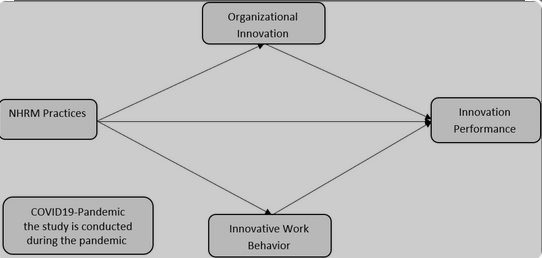The COVID-19 pandemic has brought about unprecedented challenges, impacting employees’ well-being, work dynamics, and overall resilience. Human Resource (HR) practices play a crucial role in supporting employees during such times. This study highlights Innovative Human Resource practices to improve employee resilience during the COVID-19 pandemic:

Flexible Work Arrangements:
Implement and communicate flexible work schedules, remote work options, and compressed workweeks to help employees balance work and personal responsibilities.
Mental Health Support Programs:
Offer mental health resources such as counseling services, webinars, and workshops to address the emotional challenges brought on by the pandemic. Consider partnerships with mental health professionals or apps.
Wellness Initiatives:
Introduce virtual fitness classes, mindfulness sessions, or wellness challenges to encourage employees to prioritize physical and mental well-being. Provide resources for home ergonomics and healthy lifestyle habits.
Communication and Transparency:
Foster open and transparent communication about the organization’s situation, plans, and any changes. Regularly update employees on the company’s response to the pandemic to reduce uncertainty.
Skill Development Opportunities:
Offer online learning and development opportunities to help employees acquire new skills or enhance existing ones. This can boost their confidence and resilience, preparing them for future challenges.
Recognition and Appreciation Programs:
Implement recognition programs to acknowledge and appreciate employees for their hard work and dedication during challenging times. Personalized, public recognition can boost morale.
Employee Assistance Programs (EAPs):
Enhance or introduce EAPs that provide confidential counseling, financial advice, and other support services to help employees cope with personal and professional challenges.
Remote Onboarding and Team Building:
Develop innovative strategies for remote onboarding to help new hires feel connected. Facilitate virtual team-building activities and create opportunities for social interactions.
Agile Performance Management:
Shift towards more frequent, agile performance management practices that focus on continuous feedback and goal adjustments. This can help employees adapt to changing circumstances more effectively.
Financial Wellness Programs:
Offer financial planning resources and workshops to help employees navigate economic uncertainties. This can include budgeting advice, debt management, and information about available financial assistance.
Crisis Communication Plan:
Develop a comprehensive crisis communication plan that outlines how the organization will communicate during challenging times. Ensure the plan includes clear channels, key messages, and a feedback mechanism.
Collaborative Decision-Making:
Involve employees in decision-making processes that directly impact them. Solicit input and feedback on important matters to make them feel valued and engaged in the organization’s resilience efforts.
Support for Caregivers:
Recognize the challenges faced by employees who are caregivers. Offer resources, support groups, or flexible scheduling options to help them balance work and caregiving responsibilities.
Technology for Connection:
Leverage technology to create virtual spaces for casual interactions among employees. This can include virtual coffee breaks, online social events, or collaboration tools that facilitate communication.
Resilience Training Programs:
Provide resilience training programs to help employees develop coping mechanisms and skills to navigate uncertainty. This can include workshops on stress management, adaptability, and emotional intelligence.
By implementing these innovative HR practices, organizations can contribute to building a more resilient workforce during the challenging times brought about by the COVID-19 pandemic.
